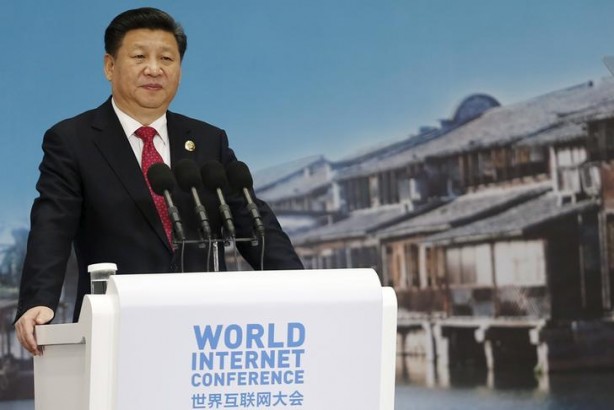
China says global war on terror should also target Uighur militants
All the pomp was part of China’s continuing efforts to demonstrate that it is a sophisticated leader on international issues, a power worthy of respect.
China wants to play a more central role in influencing global governance. In spite of recent hiccups in its economy, it is beginning to feel and act like a great power. For the past decade, US policymakers across administrations have urged China to be more proactive and join the “governing board” of the world. Their unstated hope was that, in return for this generous gesture, China would accept without change the international norms that the United States and Europe have established. That’s wishful thinking. Commensurate with its new power, China will most likely seek to amend global governance to fit its needs.
This is all the more reason for Washington to keep talking to Beijing about all issues, including Internet freedom and cybersecurity, on which they likely will never agree.
The Wuzhen summit left no room for optimism. President Xi Jinping made clear that “freedom and order” on the Internet must go together, and foreign countries and companies should respect China’s “network sovereignty.” In other words, there will be no reprieve from censorship for the Chinese people, which Xi’s administration has stepped up substantially.
While Xi emphasized that China opposes all types of cyber crime, including cyber espionage for commercial gain, recent Chinese hacks into US companies have been dramatic. Behind the scenes, US-Chinese dialogues on the subject are showing only fitful progress.
Washington should not acquiesce to Chinese views on these points. It should instead address the disagreements through intense, confidential government-to-government diplomacy. The administration is more likely to make progress in private rather than through public grandstanding. Washington’s eyes are clearly wide open to the strong disagreements, yet it should welcome Beijing’s willingness to become a stakeholder in the international system with efforts like the Wuzhen summit.
Metro train project: Govt, Chinese bank ink Rs162b loan agreement
Internet governance is not the only global issue on which China has recently stepped up to lead. After decades of being mostly quiet on the United Nations Security Council, Beijing recently made a stunning reversal. It almost tripled its contribution to the UN budget, increased Chinese peacekeepers by several thousand and committed several billion dollars in aid for the poorest countries to meet the UN’s sustainable development goals.
This trend at the United Nations is very much in the right direction even as China continues to act militarily in some ways Washington doesn’t like. On climate change, too, China made a dramatically positive move. The landmark US-China agreement, signed in December 2014, led the way for 195 countries to submit individual plans to curb emissions in the recent Paris accord.
The Wuzhen summit reflects a similar desire by China to be seen as a leader on Internet governance. The West should cautiously welcome this.
The United States will continue to disagree vehemently with China on their domestic censorship efforts and their continued hacking into US government and company systems.
Yet on Internet governance, there is some hope. For years, China and Russia strongly opposed the US-led “multi-stakeholder” approach to Internet governance, which gives companies, nonprofits, individuals and governments all a voice in how one global Internet is managed. At times, both countries even threatened to split off into a patchwork of incompatible networks that would have made it far more difficult to transmit information or do electronic commerce around the world.
At Wuzhen, however, Xi sounded far closer to the Western approach than he has before. He contended that Internet governance should involve “multi-party participation . . . including governments, international organizations, Internet companies, technology companies, nongovernmental institutions and individual citizens.”
Behind the scenes, there are still substantial disagreements. Yet China’s recognition that companies, nongovernmental organizations and others should have a role in Internet governance shows its position may be gradually converging with that of the West.
Chinese companies visit to explore Pakistani market
Many foreign-policy analysts and journalists have been skeptical and dismissive of China’s proposals at Wuzhen. Some criticised US technology firms for participating. They pointed out, gleefully, that senior Western government leaders were largely absent, though those in China’s neighborhood participated, including Pakistan, Russia and Central Asia. This criticism is shortsighted. Washington should certainly continue to press China and others on issues on which they disagree, including censorship and cyber theft.
The administration, however, should not assume that China will adopt its vision of the world unchanged. It is preferable to have China and other rising powers inside a larger tent — even if they often disagree — rather than on the outside creating an alternative order that Washington cannot influence.
-(1)1717678110-0/Kendrick-(1)-(1)1717678110-0-405x300.webp)





1732445375-0/Untitled-design-(9)1732445375-0-270x192.webp)


1732428810-0/Copy-of-Untitled-(3)1732428810-0-270x192.webp)
1732425487-0/BeFunk_§_]__-(42)1732425487-0.jpg)






COMMENTS
Comments are moderated and generally will be posted if they are on-topic and not abusive.
For more information, please see our Comments FAQ